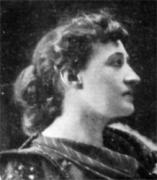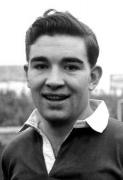|
|
||||||||||||||||||||||||
 |
Featured person
Frances Elizabeth Clarke
Recently added |
Jackie Blanchflower (1933 - 1998): |
||||||||||||||||||||||

|
| Jackie Blanchflower |
John (“Jackie”) Blanchflower was a highly talented and accomplished footballer whose career may have been overshadowed by his celebrated elder brother, Danny Blanchflower, but was cruelly curtailed at its peak in one of the sport’s most catastrophic human disasters.
It did not take his elder brother long to induct Jackie into his early-rising scheme, whether for helping out on paper rounds, or football training. Despite his juniority, Jackie was the first – just - of the brothers to join a club in England, in his case, Manchester United, whose youth scheme he joined in 1949 from local side Boyland. At this time Manchester were the dominant side in England, though their manager, Busby, was in the process of building a new squad including many young players, of whom Blanchflower was one – the legendary “Busby Babes” as they were known. (Another was Harry Gregg, from Tobermore, County Londonderry, who was to be voted best goalkeeper of the World Cup Finals of 1958.)
A versatile player and a fine all-round athlete, Blanchflower’s first appearance in a professional game was for Manchester United on 24 November 1951 against Liverpool, playing at right-half, though it was as an inside-forward that he attained a regular place in 1953/54, the season in which he won his first full international cap. But competition was intense, including from the exciting new talent Bobby Charlton, and by the 1956-1957 season he was playing as a centre-back, Busby exploiting his intelligent tactical awareness, balance, power in the air, physical strength (his team-mates jokingly called him “Twiggy”) and distribution. To underline his versatility, in Manchester’s most notable match that season, the FA Cup Final, the regular goalkeeper had to leave the field injured, and there being no substitute system at that time, Blanchflower took over in goal, and though Manchester lost, Blanchflower’s performance was highly praised. During his time at the club they won two League Championships, and in 117 appearances Blanchflower scored 27 goals.
His international career comprised 6 appearances at schoolboy level, and 12 senior appearances from 1954-1958, scoring one goal. He had been a key player in the Northern Ireland side which qualified for the 1958 World Cup Finals, including playing in the victory in Belfast against Italy which secured qualification. Northern Ireland went on to reach the second round in the Finals and, with a squad depleted by injuries, lost only to the highest-scoring team in the tournament, France. Unfortunately, Blanchflower was missing from the tournament, in tragic circumstances.
On 6 February 1958, the Manchester United squad were returning from a European Cup match in Belgrade, when their aircraft on take-off from Munich airport crashed in extremely bad weather conditions, and 23 of the 43 passengers on board were killed. Blanchflower was very seriously injured, suffering from a fractured pelvis, multiple limb fractures, and crushed kidneys. Such were his injuries that the last rites were administered at the crash site – Blanchflower had been rescued from the wreckage by goalkeeper Harry Gregg, and was lying on the runway. This disaster spelt the end of his footballing career and was a bitter psychological blow. Though he remained optimistic about a return to his beloved football, this proved, unsurprisingly, impossible.
Subsequently, he started several of his own businesses, but plagued with bad luck (when he opened a confectioner’s, a supermarket was built nearby, and when he worked as a bookmaker a harsh winter saw a lot of horse races cancelled) none of these succeeded. He did however make a success compèring his wife, a successful club vocalist with the Vic Lewis Big Band in the 1950s who came out of retirement decades later. With his self-deprecating charm and extempore wit, Blanchflower soon found himself in demand as an after-dinner speaker.
His brother Danny said of his brother on his final admission, after much hope-filled attempts at a return to the game, that his football days were over: “There comes a time when even an Irishman must give up fighting for lost causes...it has been a hard fight, a bitter fight and the price was a broken heart. Then came the real fight.” Yet late in his life he reflected that while he had been unlucky, he had nevertheless overcome his bitter regret and expressed himself most grateful for his football career, prematurely and tragically ended as it had been.
| Born: | 7 March 1933 |
| Died: | 2 September 1998 |
| Richard Froggatt |
| Acknowledgements: Wesley McCann |


Home | Our Policies | Plaques | Browse | Search | Sponsors | Links | Help | Contact
Privacy & Disclaimer | Cookie Policy | Site Map | Website Design By K-Point
© 2024 Ulster History Circle








